Abstract
African Americans have higher rates of hypertension and poorer health status than their white counterparts. This study assessed the relationship between health status, cardiovascular risk factors, and measured blood pressure. Free blood pressure screenings were performed at businesses and organizations located in west Baltimore. All individuals with cardiovascular risk factors were offered health education. Also, participants with a measured blood pressure of > or = 140/90 mm Hg were referred for free medical treatment. Participants completed a questionnaire that included demographics, cardiovascular risk factors, the Medical Outcomes Study SF 36, and two tests on cholesterol and heart disease knowledge. A total of 1389 African-American men and women were screened; 20% were found to have high normal blood pressure and 31% had stage 1 hypertension or higher. Those with hypertension reported lower physical functioning and poorer general health than those without high blood pressure. When compared with US normative data, participants reported higher levels in vitality and physical and emotional role functioning, more bodily pain, and poorer general health, but they were similar in physical functioning, social functioning, and mental health. Preliminary data suggest that hypertension does have an effect on health function.
Full text
PDF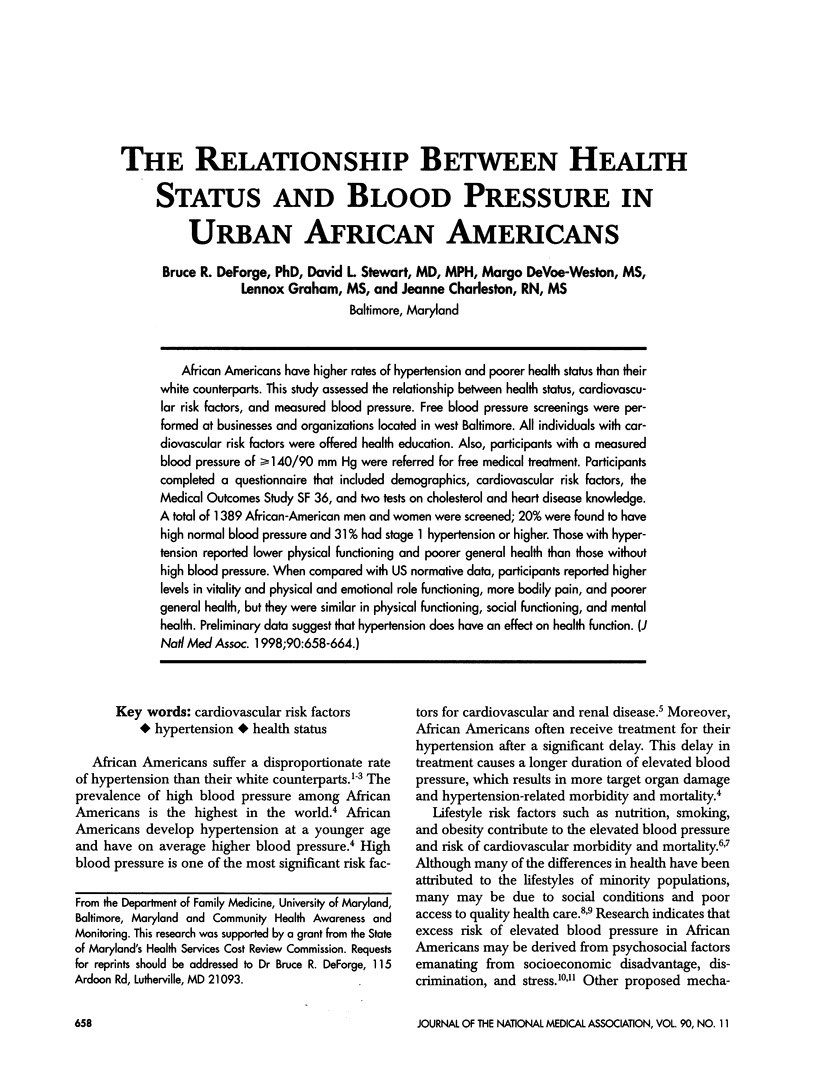
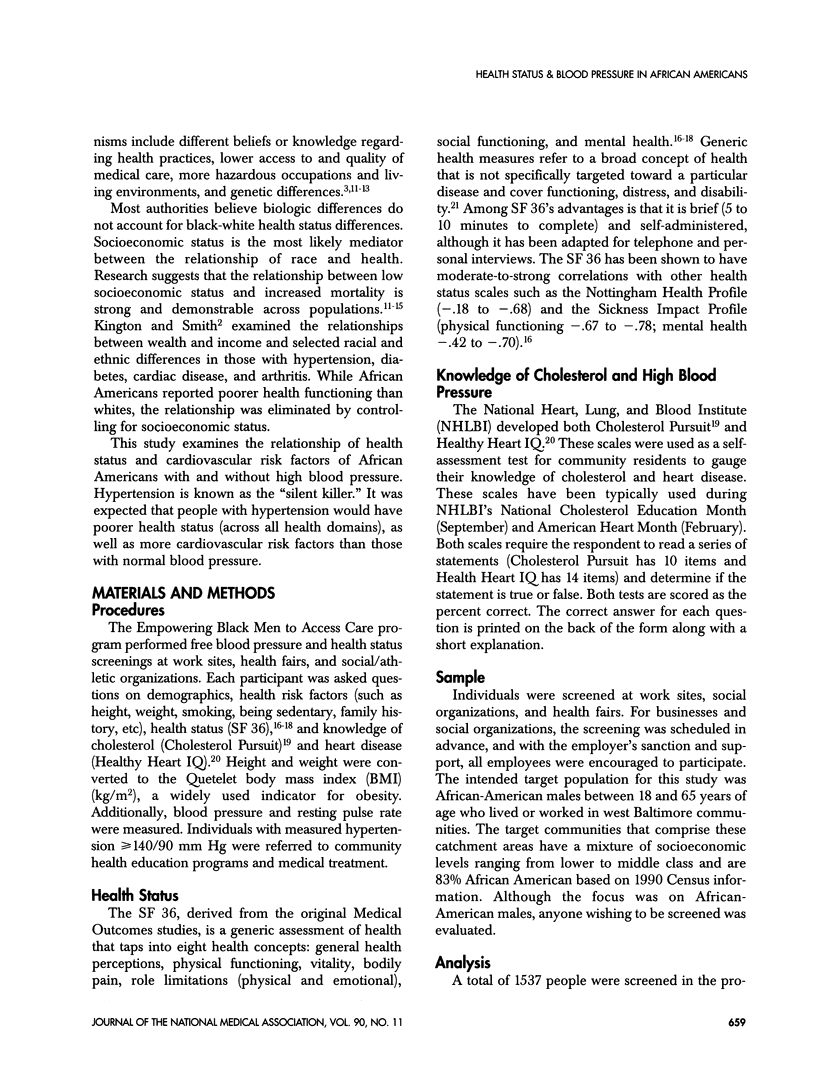
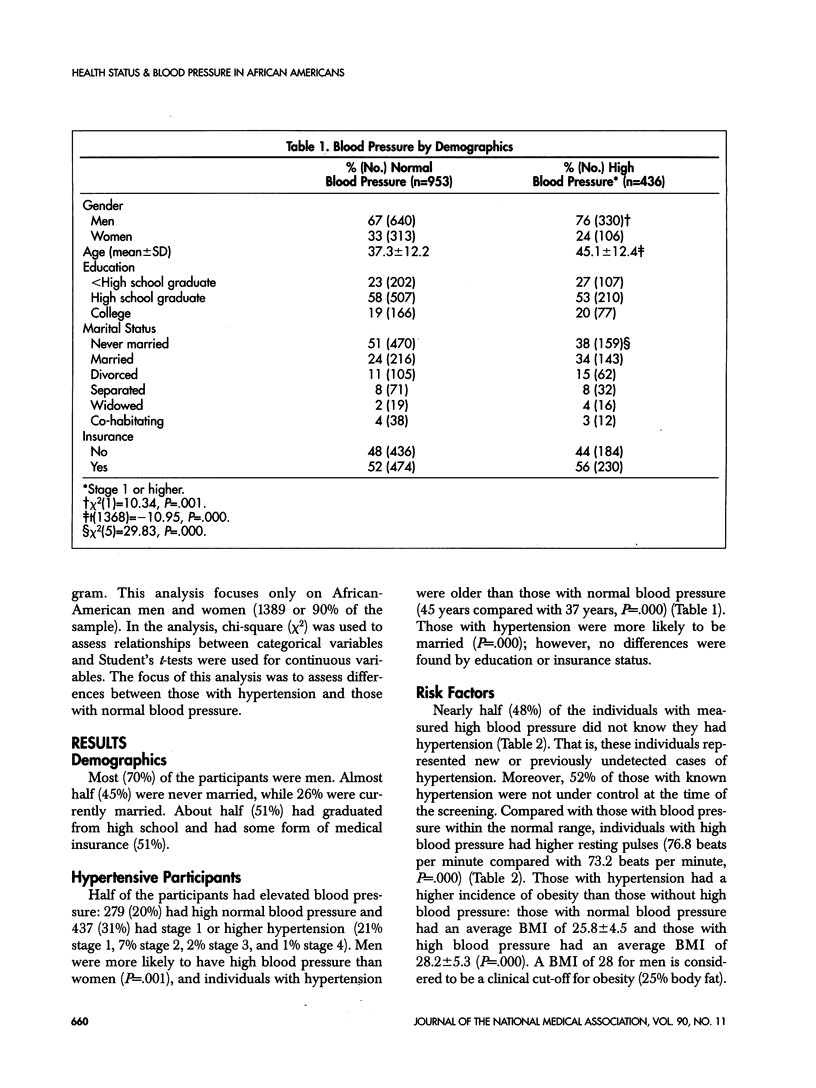
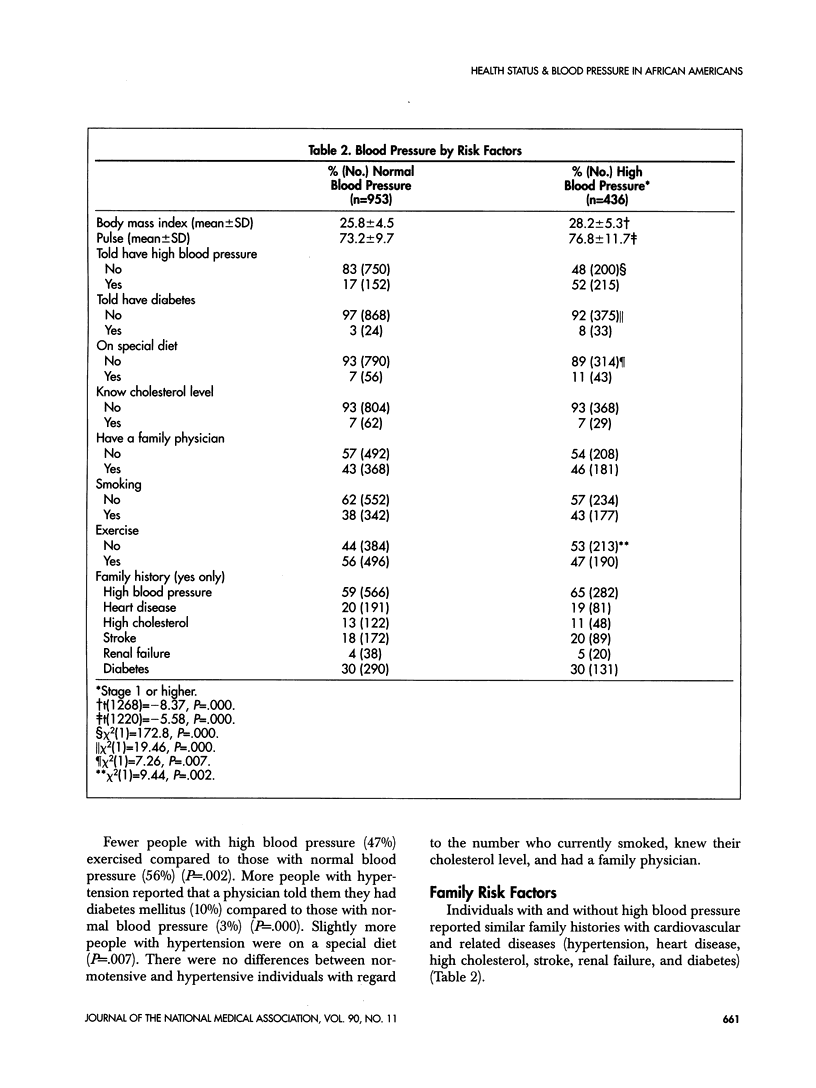
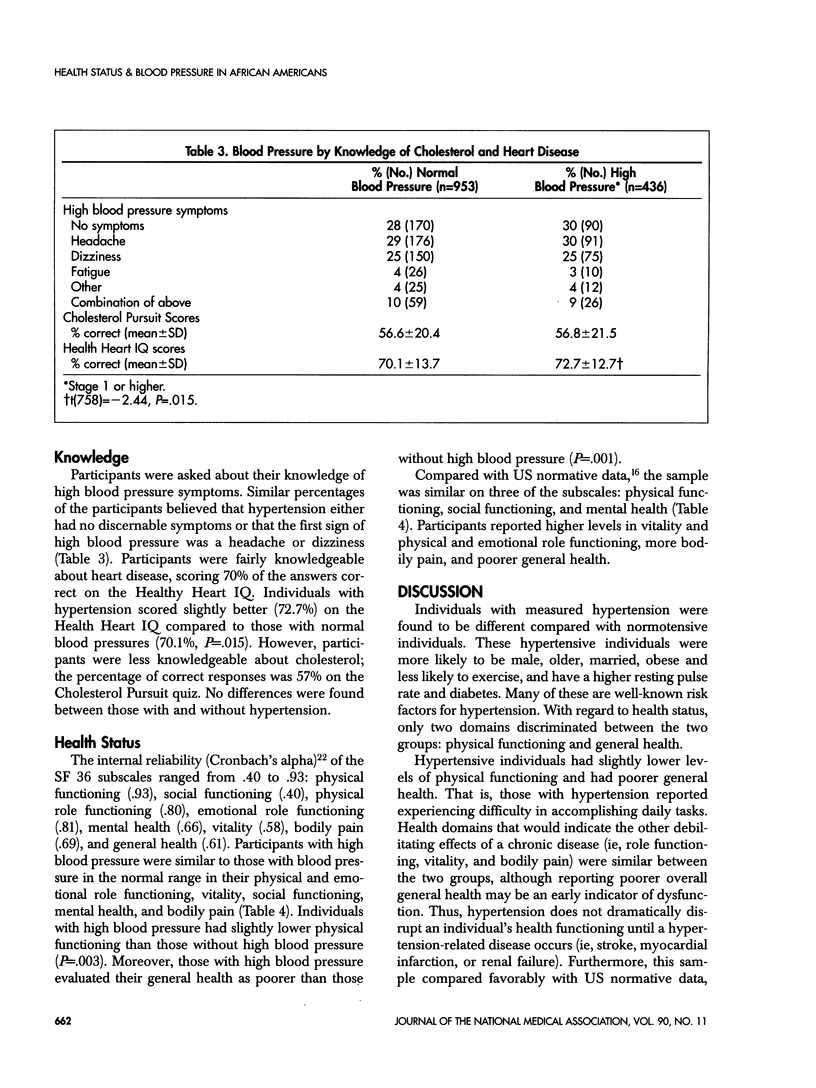
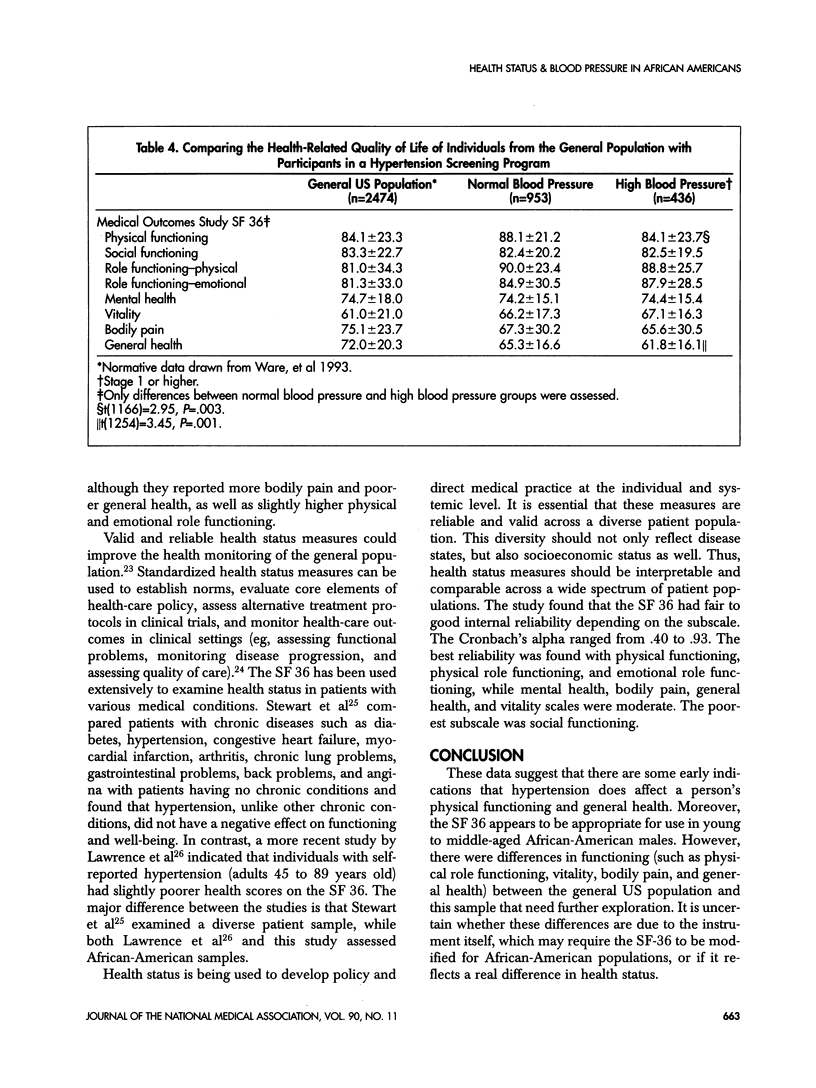
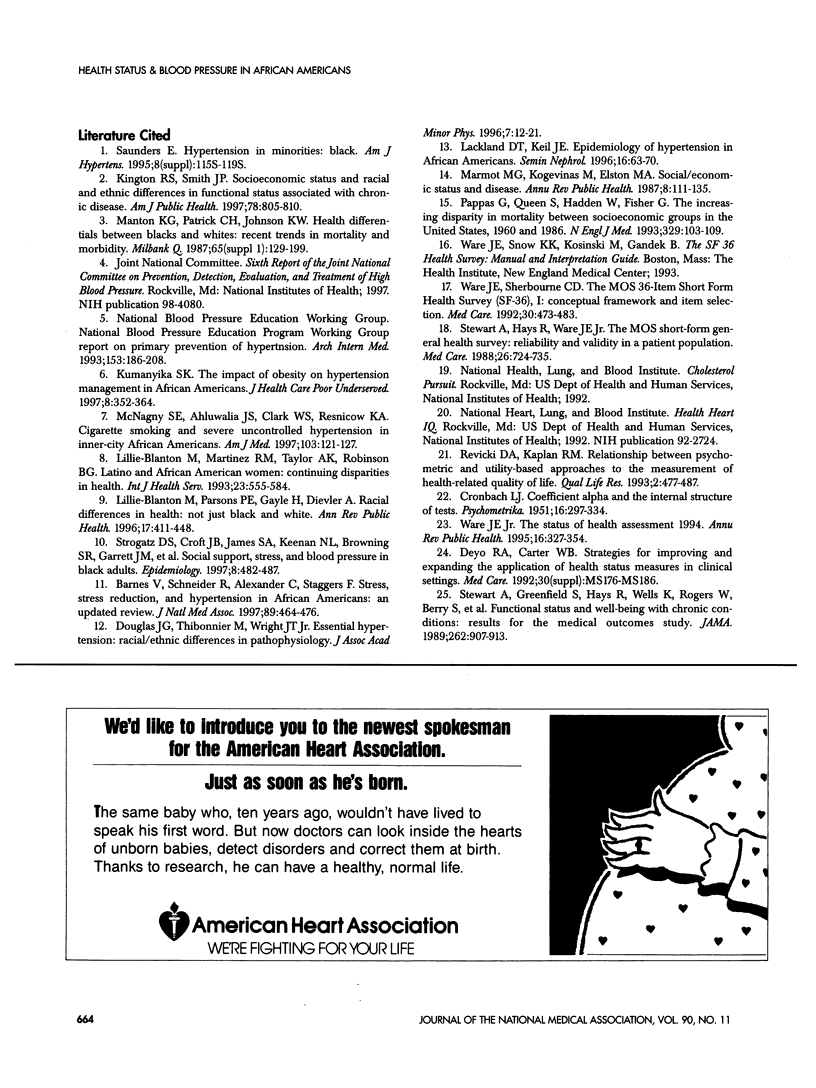
Selected References
These references are in PubMed. This may not be the complete list of references from this article.
- Barnes V., Schneider R., Alexander C., Staggers F. Stress, stress reduction, and hypertension in African Americans: an updated review. J Natl Med Assoc. 1997 Jul;89(7):464–476. [PMC free article] [PubMed] [Google Scholar]
- Deyo R. A., Carter W. B. Strategies for improving and expanding the application of health status measures in clinical settings. A researcher-developer viewpoint. Med Care. 1992 May;30(5 Suppl):MS176–MS209. doi: 10.1097/00005650-199205001-00015. [DOI] [PubMed] [Google Scholar]
- Kington R. S., Smith J. P. Socioeconomic status and racial and ethnic differences in functional status associated with chronic diseases. Am J Public Health. 1997 May;87(5):805–810. doi: 10.2105/ajph.87.5.805. [DOI] [PMC free article] [PubMed] [Google Scholar]
- Kumanyika S. K. The impact of obesity on hypertension management in African Americans. J Health Care Poor Underserved. 1997 Aug;8(3):352–365. doi: 10.1353/hpu.2010.0532. [DOI] [PubMed] [Google Scholar]
- Lackland D. T., Keil J. E. Epidemiology of hypertension in African Americans. Semin Nephrol. 1996 Mar;16(2):63–70. [PubMed] [Google Scholar]
- Lillie-Blanton M., Martinez R. M., Taylor A. K., Robinson B. G. Latina and African American women: continuing disparities in health. Int J Health Serv. 1993;23(3):555–584. doi: 10.2190/MNCJ-NB8E-M0WA-1FGM. [DOI] [PubMed] [Google Scholar]
- Lillie-Blanton M., Parsons P. E., Gayle H., Dievler A. Racial differences in health: not just black and white, but shades of gray. Annu Rev Public Health. 1996;17:411–448. doi: 10.1146/annurev.pu.17.050196.002211. [DOI] [PubMed] [Google Scholar]
- Manton K. G., Patrick C. H., Johnson K. W. Health differentials between blacks and whites: recent trends in mortality and morbidity. Milbank Q. 1987;65 (Suppl 1):129–199. [PubMed] [Google Scholar]
- Marmot M. G., Kogevinas M., Elston M. A. Social/economic status and disease. Annu Rev Public Health. 1987;8:111–135. doi: 10.1146/annurev.pu.08.050187.000551. [DOI] [PubMed] [Google Scholar]
- McNagny S. E., Ahluwalia J. S., Clark W. S., Resnicow K. A. Cigarette smoking and severe uncontrolled hypertension in inner-city African Americans. Am J Med. 1997 Aug;103(2):121–127. doi: 10.1016/s0002-9343(97)00131-9. [DOI] [PubMed] [Google Scholar]
- Pappas G., Queen S., Hadden W., Fisher G. The increasing disparity in mortality between socioeconomic groups in the United States, 1960 and 1986. N Engl J Med. 1993 Jul 8;329(2):103–109. doi: 10.1056/NEJM199307083290207. [DOI] [PubMed] [Google Scholar]
- Revicki D. A., Kaplan R. M. Relationship between psychometric and utility-based approaches to the measurement of health-related quality of life. Qual Life Res. 1993 Dec;2(6):477–487. doi: 10.1007/BF00422222. [DOI] [PubMed] [Google Scholar]
- Saunders E. Hypertension in minorities: blacks. Am J Hypertens. 1995 Dec;8(12 Pt 2):115s–119s. doi: 10.1016/0895-7061(95)00309-6. [DOI] [PubMed] [Google Scholar]
- Stewart A. L., Greenfield S., Hays R. D., Wells K., Rogers W. H., Berry S. D., McGlynn E. A., Ware J. E., Jr Functional status and well-being of patients with chronic conditions. Results from the Medical Outcomes Study. JAMA. 1989 Aug 18;262(7):907–913. [PubMed] [Google Scholar]
- Stewart A. L., Hays R. D., Ware J. E., Jr The MOS short-form general health survey. Reliability and validity in a patient population. Med Care. 1988 Jul;26(7):724–735. doi: 10.1097/00005650-198807000-00007. [DOI] [PubMed] [Google Scholar]
- Strogatz D. S., Croft J. B., James S. A., Keenan N. L., Browning S. R., Garrett J. M., Curtis A. B. Social support, stress, and blood pressure in black adults. Epidemiology. 1997 Sep;8(5):482–487. doi: 10.1097/00001648-199709000-00002. [DOI] [PubMed] [Google Scholar]
- Ware J. E., Jr, Sherbourne C. D. The MOS 36-item short-form health survey (SF-36). I. Conceptual framework and item selection. Med Care. 1992 Jun;30(6):473–483. [PubMed] [Google Scholar]


